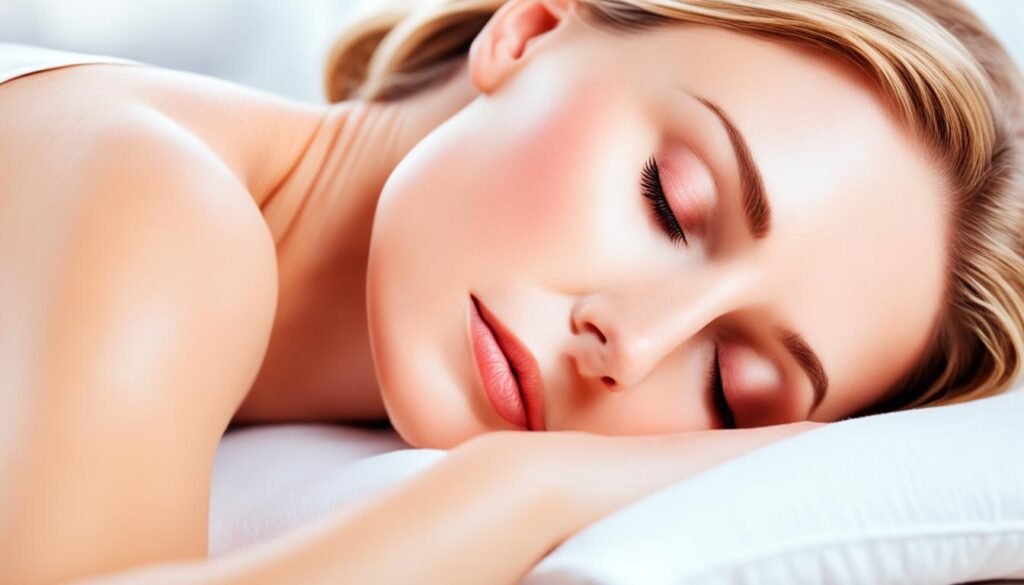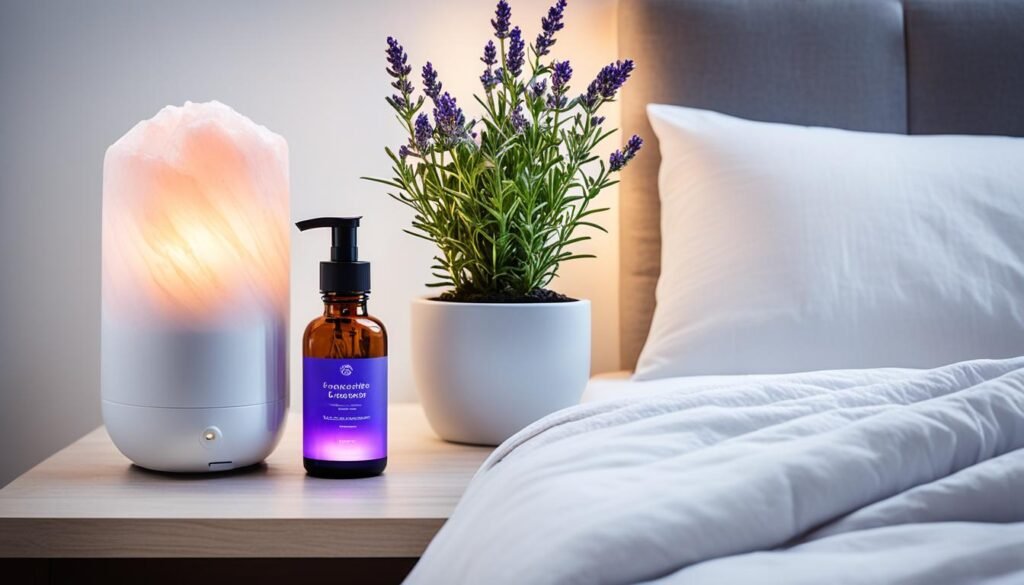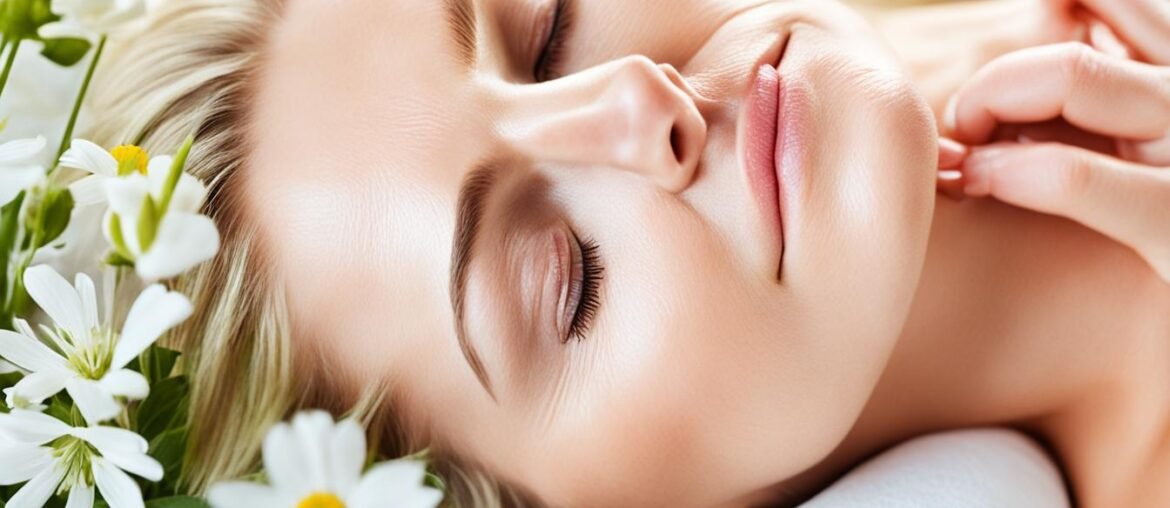Did you know that lack of sleep can significantly impact the health of your skin? It’s not just about feeling tired – poor sleep can actually affect the appearance and condition of your skin. Quality sleep plays a crucial role in maintaining a clear complexion, preventing signs of aging, and even improving acne. Let’s delve into the fascinating connection between sleep and skin health and discover how better sleep can transform the way your skin looks and feels.
Key Takeaways:
- Better sleep promotes a clearer complexion and reduces the signs of aging.
- Insufficient sleep can worsen existing skin conditions and lead to acne formation.
- Sleep allows the skin to rejuvenate, repair damage, and rebuild collagen.
- Establishing healthy sleep habits and adopting a skincare routine can optimize your skin health.
- Combining quality sleep with a well-balanced lifestyle enhances both your overall well-being and the appearance of your skin.
How Sleep Affects Your Skin
Research has shown that the quality of sleep we get directly impacts the health and appearance of our skin. Lack of sleep can result in a variety of visible effects, including hanging eyelids, swollen eyes, darker undereye circles, paler skin, more wrinkles and fine lines, and droopy corners of the mouth. These physical signs are a clear indication of the toll that insufficient sleep can take on our skin.
Not only does a poor night’s sleep manifest in these physical changes, but it can also affect how others perceive us. Studies have found that sleep deprivation and its effects on the skin can negatively impact perceptions of attractiveness, health, sleepiness, and even trustworthiness.
Understanding these findings highlights the importance of prioritizing quality sleep to maintain healthy and youthful skin. By giving our bodies the sleep they need, we can prevent the visible signs of sleep deprivation and promote a healthier, more radiant complexion.
| Skin Effects of Lack of Sleep | Perceived Effects on Others |
|---|---|
| Hanging eyelids | Decreased attractiveness |
| Swollen eyes | Perceived as less healthy |
| Darker undereye circles | Increase in sleepiness perception |
| Paler skin | Decreased trustworthiness |
| More wrinkles and fine lines | – |
| Droopy corners of the mouth | – |
The Benefits of Sleep for Skin Rejuvenation

During sleep, our body undergoes crucial repair and restoration processes, and our skin is no exception. Adequate sleep provides numerous benefits for skin rejuvenation, promoting a healthier and more youthful appearance.
One of the key benefits of sleep for skin is increased blood flow. During sleep, blood flow to the skin is enhanced, leading to improved oxygen and nutrient delivery. This increased blood flow promotes the rebuilding of collagen, the structural protein responsible for skin strength and elasticity. Collagen production during sleep helps repair damage caused by UV exposure, reducing the appearance of wrinkles and age spots, and contributing to a more youthful complexion.
Moreover, sleep allows the skin to recover from daily environmental stressors. Throughout the day, our skin is exposed to various pollutants, UV rays, and other external factors that can cause damage and accelerate the aging process. During sleep, our skin has the opportunity to repair and regenerate, undoing the harm caused by these stressors. This rejuvenation process helps to maintain skin health and vitality, preventing premature aging and promoting a youthful glow.
The Importance of Collagen in Skin Health
Collagen is a crucial component of healthy and vibrant skin. It provides structure and strength, supporting the skin’s elasticity and firmness. Unfortunately, collagen production naturally declines as we age, leading to the development of wrinkles, sagging skin, and a dull complexion. By prioritizing quality sleep, we can stimulate collagen synthesis and help slow down the aging process, preserving the youthfulness of our skin for longer.
| Benefits of Sleep for Skin Rejuvenation | How Sleep Impacts Collagen Synthesis |
|---|---|
| Promotes rebuilding of collagen fibers | Enhanced blood flow during sleep delivers essential nutrients required for collagen synthesis. |
| Reduces wrinkles and fine lines | Collagen production during sleep helps repair damage and maintain skin elasticity. |
| Repairs UV-induced damage | Increased blood flow to the skin during sleep aids in repairing UV-induced skin damage, reducing the appearance of age spots and hyperpigmentation. |
By understanding the benefits of sleep for skin rejuvenation and the crucial role of collagen in the maintenance of healthy skin, we can prioritize quality sleep as an integral part of our skincare routine. Incorporating habits that promote deeper, more restorative sleep, such as establishing a relaxing bedtime routine, creating a comfortable sleep environment, and minimizing exposure to stimulating activities before bed, can further enhance the positive impact of sleep on our skin health.
Sleep and Skin Complexion
The circadian rhythm, our body’s internal clock, plays a crucial role in regulating the behavior of the skin. During the night, while we sleep, the skin experiences increased blood flow, which aids in repairing damaged cells and enhances overall complexion.
However, the effects of insufficient sleep and late bedtimes on the skin can be undesirable. Lack of quality sleep can lead to peeling skin, dehydration, and an increase in the production of oily secretions, which can result in acne breakouts.
By prioritizing quality sleep, we can promote a clearer and more radiant skin complexion. Adequate sleep allows the skin to undergo necessary repair processes, supporting its natural rejuvenation and contributing to healthier, glowing skin.
| Effects of Quality Sleep on Skin Complexion | Effects of Lack of Sleep on Skin Complexion |
|---|---|
|
|
Sleep and Anti-Aging Effects on Skin

Adequate sleep is crucial for the overall health of our skin, especially when it comes to slowing down the aging process. During sleep, the body produces essential growth hormones that promote muscle growth, cell rebuilding, and collagen production. Collagen is a protein that gives our skin its elasticity and firmness, and its production increases during sleep, resulting in the reduction of wrinkles and fine lines.
By prioritizing quality sleep, we can effectively support the anti-aging effects on our skin. Through the natural processes that occur during sleep, our skin is able to repair and rejuvenate itself, leading to a more youthful and radiant appearance. The combination of growth hormone release and increased collagen production contributes to smoother, firmer skin with diminished signs of aging.
By ensuring we get enough sleep and maintaining good sleep hygiene, we can optimize our body’s natural anti-aging mechanisms and promote healthier, more youthful-looking skin. Additionally, incorporating a proper skincare routine that includes moisturization and protection is essential to support the anti-aging effects of sleep.
Benefits of quality sleep for anti-aging effects on skin:
- Reduced appearance of wrinkles and fine lines
- Increase in skin elasticity and firmness
- Enhanced skin rejuvenation and repair
- Improved overall skin texture and tone
- Protection against premature aging
| Factors | Effects on Aging |
|---|---|
| Lack of sleep | Accelerated aging, increased signs of wrinkles and fine lines |
| Adequate sleep | Slows down the aging process, promotes collagen production, reduces signs of aging |
“Quality sleep provides the foundation for maintaining healthy, youthful-looking skin. By prioritizing sleep and embracing good sleep habits, we can support our body’s natural anti-aging processes and achieve a more refreshed and rejuvenated appearance.”
– Dr. Emily Smith, Dermatologist
In summary, getting enough quality sleep is essential for the anti-aging effects it has on our skin. Through the production of growth hormones and increased collagen synthesis, sleep promotes skin rejuvenation, reduces the appearance of wrinkles, and improves overall skin health.
Sleep and Acne Prevention
Prioritizing quality sleep is crucial for maintaining clear and healthy skin, reducing the likelihood of acne formation. Lack of sleep can lead to increased stress levels, triggering the release of hormones that promote the development of acne. Additionally, insufficient sleep may disrupt the body’s inflammatory response, making it more challenging for the skin to heal existing acne or prevent new breakouts.
Research has shown that sleep deprivation can have a direct impact on acne severity. One study found that individuals with acne reported significantly shorter sleep durations and poorer sleep quality compared to those without acne. Furthermore, individuals who experienced inadequate sleep also showed increased sebum (oil) production and higher levels of inflammation, both of which can contribute to the formation of acne.
To emphasize the importance of quality sleep in acne prevention, let’s take a closer look at the factors that link sleep and acne development:
Sleep and Hormonal Balance
Adequate sleep plays a vital role in maintaining hormonal balance, especially those hormones involved in regulating sebum production, such as cortisol and androgens. Chronic sleep deprivation can disrupt the normal functioning of these hormones, leading to increased oil production and clogged pores, which are common triggers for acne breakouts.
Reestablishing a healthy sleep routine that allows for sufficient rest can help regulate hormonal levels, reducing the risk of acne formation.
Sleep and Inflammatory Response
Sleep deprivation can impair the body’s inflammatory response, which is crucial for repairing damaged skin cells and combating acne-causing bacteria. Inadequate sleep compromises the immune system, weakening its ability to fight off infections and inflammation.
By prioritizing quality sleep, we can support a robust immune system and promote an efficient inflammatory response, aiding in the prevention and healing of acne.
Tips for Quality Sleep to Prevent Acne:
Implementing good sleep hygiene practices can significantly contribute to improving sleep quality, resulting in healthier skin and reduced acne breakouts. Here are some tips to prioritize quality sleep:
- Establish a consistent sleep schedule, going to bed and waking up at the same time every day.
- Create a relaxing bedtime routine that helps signal your body for sleep, such as taking a warm bath or engaging in relaxation exercises.
- Avoid stimulating activities, screens, and bright lights close to bedtime.
- Ensure your sleep environment is cool, dark, and comfortable.
- Avoid consuming caffeine or heavy meals close to bedtime.
- Engage in regular physical activity during the day to promote better sleep at night.
Remember, quality sleep is an essential part of maintaining clear and healthy skin. By prioritizing restful sleep and following these tips, you can promote a clearer complexion and reduce the likelihood of acne breakouts.
Tips for Better Sleep to Improve Skin Health
To optimize sleep for improved skin health, it’s crucial to establish healthy sleep habits. Here are some tips to help you achieve better sleep and promote healthier skin:
- Get the recommended seven to nine hours of sleep each night to allow your body and skin to rejuvenate.
- Develop a nighttime routine that includes washing your face before bed to remove dirt and makeup. This helps prevent clogged pores and allows your skin to breathe while you sleep.
- Use an overnight moisturizer to keep your skin hydrated throughout the night. Hydrated skin is less prone to dryness, irritation, and premature aging.
- Sleep on your back or use a skin-friendly pillow to minimize pressure on your face and reduce the risk of wrinkles and creases forming.
- Elevate your head slightly with an extra pillow to reduce eye puffiness caused by fluid build-up overnight.
- Avoid sun exposure while sleeping to protect your skin from harmful UV rays. Close curtains or blinds to keep your sleeping environment dark.
- Embrace relaxation techniques such as taking a warm bath before bed. This can help calm your mind and prepare your body for a restful night’s sleep.
By incorporating these tips into your routine, you can enhance the quality of your sleep and promote healthier skin, leading to a more radiant complexion and overall skin health.
| Tip | Description |
|---|---|
| Get Adequate Sleep | Ensure you get the recommended seven to nine hours of sleep each night to allow your body and skin to rejuvenate. |
| Wash Your Face Before Bed | Remove dirt and makeup to prevent clogged pores and allow your skin to breathe while you sleep. |
| Use Overnight Moisturizer | Hydrate your skin during sleep to prevent dryness, irritation, and premature aging. |
| Sleep on Your Back | Minimize pressure on your face and reduce the risk of wrinkles and creases forming. |
| Elevate Your Head | Reduce eye puffiness caused by fluid build-up overnight by elevating your head with an extra pillow. |
| Avoid Sun Exposure | Protect your skin from harmful UV rays by keeping your sleeping environment dark and avoiding sun exposure while sleeping. |
| Embrace Relaxation Techniques | Take a warm bath before bed or practice other relaxation techniques to calm your mind and promote a restful night’s sleep. |
By following these tips, you can improve your sleep quality and enhance the health and appearance of your skin.
The Impact of Diet and Lifestyle on Sleep and Skin Health

Proper sleep and skin health are influenced by our diet and lifestyle choices. To optimize both, it is important to make conscious decisions regarding our nutrition, exercise, and stress management.
Diet:
Avoid consuming caffeine and alcohol close to bedtime, as they can disrupt sleep quality. Instead, opt for a well-balanced diet that includes fruits and vegetables. These nutrient-rich foods provide essential vitamins and minerals that promote skin health and overall well-being.
Lifestyle:
Incorporating regular exercise into our daily routine not only helps promote better sleep but also improves blood circulation, which can enhance the delivery of essential nutrients to the skin. Additionally, managing stress through techniques such as meditation or yoga can help reduce anxiety and promote relaxation, contributing to better sleep and healthier skin.
“A healthy diet and lifestyle can positively impact both sleep quality and skin health. By making conscious choices and prioritizing our well-being, we can achieve better overall health and a radiant complexion.”
Tips for Incorporating Diet and Lifestyle for Better Sleep and Skin Health:
- Avoid consuming caffeine and alcohol close to bedtime.
- Include a variety of fruits and vegetables in your diet for essential nutrients.
- Incorporate regular exercise into your routine to support better sleep and overall skin health.
- Practice stress management techniques such as meditation or yoga to promote relaxation and quality sleep.
Summary
Prioritizing a healthy diet and lifestyle is essential for improving both sleep quality and skin health. By making conscious choices to avoid sleep-disrupting substances and incorporating exercise and stress management techniques, we can optimize our sleep patterns and promote radiant, healthy skin.
| Diet | Lifestyle | |
|---|---|---|
| Benefit | Provides essential nutrients for skin health | Supports better sleep and overall skin health |
| Reduces the intake of sleep-disrupting substances | Reduces stress and promotes relaxation | |
| Improves blood circulation to enhance skin nourishment |
Key Takeaways
- Avoid caffeine and alcohol close to bedtime to support better sleep quality.
- Incorporate a well-balanced diet with fruits and vegetables to provide essential nutrients for skin health.
- Engage in regular exercise to improve blood circulation and optimize skin nourishment.
- Adopt stress management techniques like meditation or yoga to reduce anxiety and promote relaxation for better sleep and healthier skin.
The Role of Skincare in Promoting Skin Health During Sleep

In addition to prioritizing sleep, it’s essential to establish a proper skincare routine to further enhance skin health during sleep. Cleansing your face before bed is crucial to remove dirt, makeup, and excess oil that can clog pores overnight. Using a moisturizer and eye cream specifically formulated for nighttime use can help hydrate and nourish the skin while you sleep. Consider incorporating products with ingredients like glycerin or retinol, known for their skin-restoring properties. By combining quality sleep with an effective skincare routine, you can maximize the benefits for your skin health.
| Steps for Skincare During Sleep | Benefits |
|---|---|
| Cleanse your face before bed | Removes dirt, makeup, and excess oil that can clog pores overnight |
| Use a moisturizer for nighttime use | Hydrates and nourishes the skin while you sleep |
| Apply an eye cream for nighttime use | Helps reduce puffiness and fine lines around the eyes |
| Consider products with glycerin or retinol | Enhances skin-restoring properties and promotes healthier skin |
Quotes:
I make sure to cleanse my face thoroughly before going to bed and use a night cream that keeps my skin hydrated throughout the night. It has significantly improved my skin health and appearance.
Using the right skincare products during sleep has transformed my skin. I wake up with a fresh, glowing complexion every morning.
- Cleanse your face before bed to remove dirt, makeup, and excess oil.
- Use a moisturizer and eye cream specifically formulated for nighttime use.
- Incorporate products with skin-restoring ingredients like glycerin or retinol.
- Follow a consistent nighttime skincare routine for optimal results.
By following these skincare practices, you can enhance the benefits of quality sleep for healthier, more radiant skin.
Conclusion
In conclusion, quality sleep is essential for improving skin health. By prioritizing better sleep habits, we can significantly enhance our skin’s appearance and overall well-being. Getting the recommended amount of sleep each night, practicing good sleep hygiene, and establishing a skincare routine can all contribute to achieving healthier, more radiant skin.
Research has shown that quality sleep promotes a clearer complexion and helps prevent acne breakouts. It also supports the anti-aging effects on the skin, reducing the appearance of wrinkles and fine lines. Moreover, during sleep, the body undergoes crucial repair and restoration processes, aiding in skin rejuvenation and promoting a more youthful appearance.
By acknowledging the importance of sleep for skin health and taking steps to optimize our sleep routine, we can reap long-term benefits. A combination of better sleep and skincare practices can help us achieve healthier skin, boosting our confidence and overall quality of life. So make sleep a priority, and watch as your skin transforms for the better.
FAQ
Can better sleep improve skin health?
Yes, quality sleep has been found to positively impact the skin, promoting a clearer complexion, anti-aging benefits, and aiding in acne prevention.
How does sleep affect your skin?
Sleep plays a crucial role in the repair and restoration processes of the skin. During sleep, increased blood flow promotes the rebuilding of collagen, repairs damage from UV exposure, and allows the skin to recover from daily environmental stressors.
What are the benefits of sleep for skin rejuvenation?
Sleep aids in the rebuilding of collagen and repairs damage, reducing wrinkles and age spots. It also provides an opportunity for the skin to recover from daily stressors, promoting a healthier and more youthful appearance.
How does sleep affect skin complexion?
The circadian rhythm regulates the behavior of the skin. At night, increased blood flow helps repair damaged cells and enhances complexion. Insufficient sleep and late bedtimes have been associated with undesirable changes in skin complexion, such as peeling skin, dehydration, and increased production of oily secretions that can lead to acne.
Can sleep have anti-aging effects on the skin?
Yes, proper sleep supports the production of growth hormones, aids in cell rebuilding and collagen production. Collagen gives the skin its elasticity and firmness, and its production increases during sleep, helping to reduce the appearance of wrinkles and fine lines.
How does sleep contribute to acne prevention?
Lack of sleep can lead to increased stress levels, triggering hormones that promote acne development. Insufficient sleep may also disrupt the body’s inflammatory response, making it more difficult for the skin to heal existing acne or prevent new breakouts.
What are some tips for better sleep to improve skin health?
To optimize sleep for improved skin health, try to get the recommended seven to nine hours of sleep each night. Develop a nighttime routine, including washing your face before bed, using an overnight moisturizer, sleeping on your back or using a skin-friendly pillow, elevating your head to reduce eye puffiness, avoiding sun exposure while sleeping, and embracing relaxation techniques such as taking a warm bath before bed.
How does diet and lifestyle impact sleep and skin health?
Consuming caffeine and alcohol close to bedtime can disrupt sleep quality. A well-balanced diet that includes fruits and vegetables provides essential nutrients for skin health. Regular exercise and stress management techniques, such as meditation or yoga, contribute to better sleep and skin health.
What role does skincare play in promoting skin health during sleep?
Establishing a proper skincare routine can further enhance skin health during sleep. Cleansing your face before bed removes dirt, makeup, and excess oil. Using a nighttime moisturizer and eye cream helps hydrate and nourish the skin. Consider incorporating products with ingredients like glycerin or retinol, known for their skin-restoring properties.




